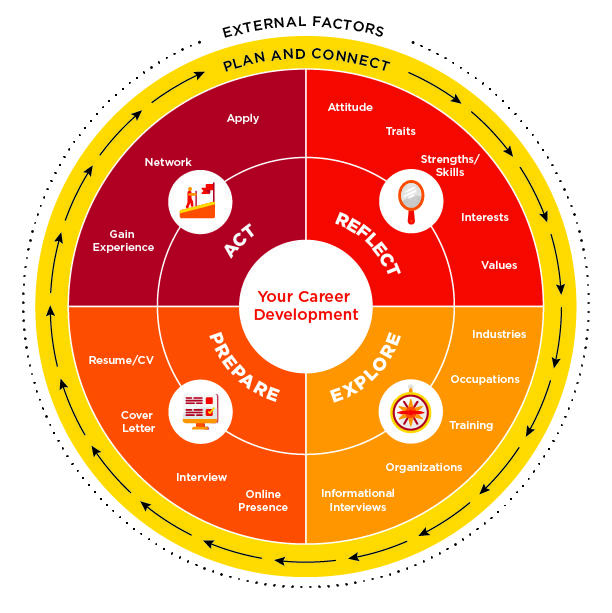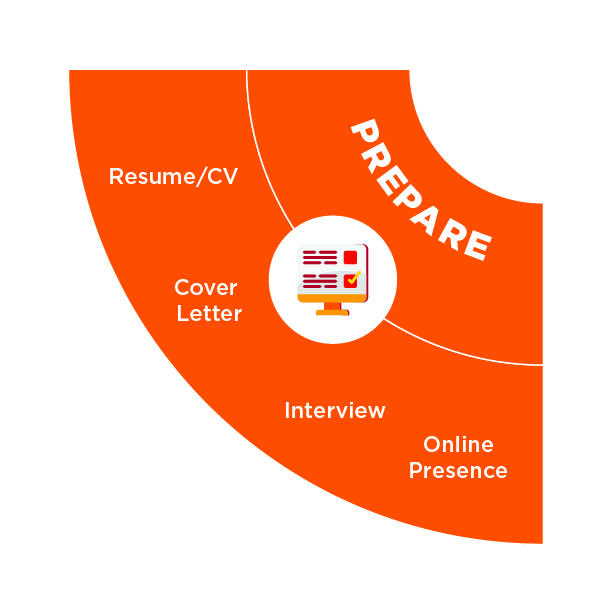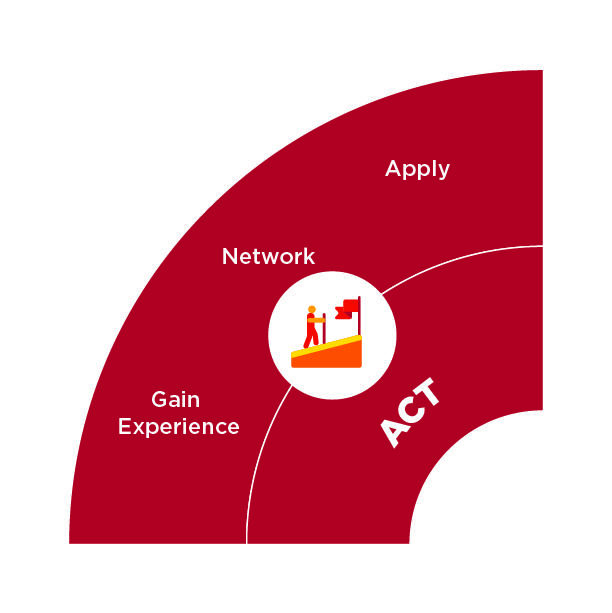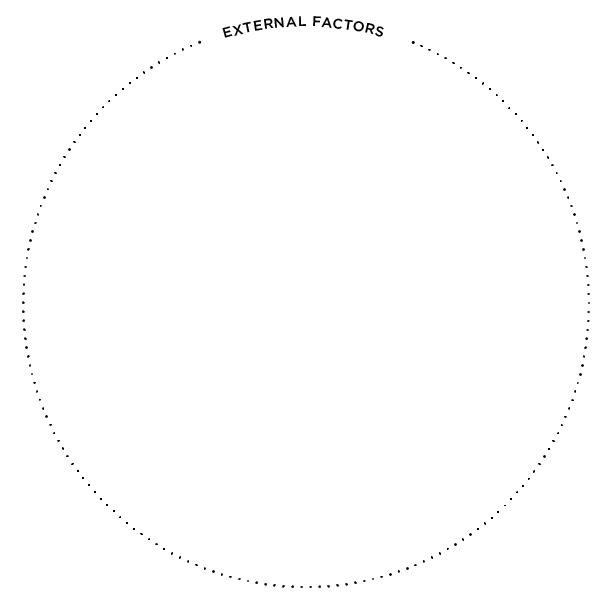Start your career journey
Looking for some guidance on your career development? The career wheel is an excellent place to start your planning and review the common stages of the career development process. It's comprised of four main sections and two external elements. Click the links below for quick navigation:
Choose your own adventure
There's no right or wrong way to explore the career wheel! If you're just starting to consider your career paths and haven't done much self-reflection, you may want to review them in order.
However, you can also review the sections in whatever order is relevant to your career development. Have a networking event coming up and need some pointers? Feel free to review "Act" right away. Feeling a bit lost and unsure of your career path? Perhaps take a step back and check out the topics under Reflect to understand your strengths and interests more fully.
Finding a career you love is rarely a straight line — take time to enjoy the journey and build experience!

Reflect
Self-awareness is the foundation for effective career planning. This section will guide you through a personal assessment of your values, interests, strengths, traits and ambitions. What does career success mean to you? At the Centre for Career & Personal Development, we believe it means pursuing and finding a career that aligns with your values, interests, strengths, traits and ambitions.
Start your self-reflection with this VISTA Worksheet. Follow this section and use the resources below to start creating your vision!
Values are the core principles that guide your life. Understanding them is crucial in helping identify majors or careers you might find fulfilling. What do you want to get from your education, career and life? Reflect on your answers through the Values Worksheet.
Interests are a key part of what defines us as humans. If you are interested in something, you are more likely to invest time, effort and energy into it. Think about the things that you enjoy in general. What do you love to do? Track your ideas on this Interests Worksheet.
You have many skills and talents. It is important to understand your unique skills to find a career that is a fit for those talents. This will result in increased career satisfaction and fulfillment. Use the Strengths Worksheet to get you thinking about your talents.
Consider completing a StrengthsQuest Formal Assessment with the Centre for Career & Personal Development. This will identify your Top 5 strengths and explore how you can leverage them in your career development. Identifying and developing your strengths will give you a way to better discuss and develop your unique combination. When you identify your talents and develop them into strengths, you'll be more productive, perform better and be more engaged.
We each have a unique way of relating to others and the world around us. Understanding your personality in terms of your behaviours, emotions, and ways of thinking, can help you find a rewarding career. Use this Traits Worksheet to help you assess your personality.
Ambitions provide a focus for your goals and career. With a tangible picture of your future, you can create the motivation to navigate the steps and hurdles between where you are now and where you are going. Use the Ambitions Worksheet to get started.
Some ambitions include:
- Limiting beliefs
- Aspiration
- Resilience (a growth-focused mindset)
To find out more about your ambitions, TruMotivate can be a useful assessment tool that helps students uncover who they are and how they are motivated. Find out more on our career assessment page.

Explore
Exploring your options and gathering information is important in making good decisions about your career prospects. With thousands of occupations and careers to choose from, this can be exciting and overwhelming all at the same time. This section will help you further identify your career interests, conduct occupational and industry research, consider future training opportunities and explore what to do with your degree.
It is important to brainstorm options and identify work possibilities that appeal to you. Online job boards and occupational databases are great starting places. Identify your top choices for further research and create a short list of criteria for what you want out of a career. Identify five to ten industries that most interest you and use the questions to promote reflection
What did you want to be growing up?
Who is your career role model?
What careers have you considered to date?
Throughout university you will often hear the question “What are you going to do with your degree?" To help answer that question, check below for great resources which will give you insight.
Review the UCalgary degree profiles and Future Students pages to view a list of all undergraduate and graduate programs.
A great way to learn more about companies is by doing your research. One way to start is by using job boards and seeing what companies are hiring. The other step you can take is using LinkedIn and following companies that interest you. Many companies share information about job postings, current projects they are doing and information about their companies values. It can be a great tool to see what their company culture is like and be the first to know about upcoming opportunities.
-
Online job boards
- Elevate – only for UCalgary students and many of the positions posted are geared to accommodate students
- Government of Alberta
- LinkedIn Jobs
- Indeed
- Federal Government
- Charity Village
- Reach Hire
Conduct information interviews, build relationships and meet people to learn more about an industry or gather information you cannot access on the computer. You can find people to connect with through:
- Student clubs or industry and professional associations
- Conferences, leadership and community involvement
- Networking, LinkedIn and employer events
- Volunteering, community or leisure activities
- Career and job fairs or trade shows
- Personal hobbies and interests
Seek advice from peers, professors, alumni or people you know from previous work or volunteer experience. Explore Social Media such as LinkedIn which provides information on Groups, People and Companies. Who would you like to connect with? Have an inside look at organizations - company salaries, reviews, interview questions, and more - all posted anonymously by employees and job seekers. Build and engage with your professional network. Access knowledge, insights and opportunities.
Check out our career clip to get more tips on doing Informational Interviews.
Have you considered following a specific career path, but discovered you need more education? For some industries, additional industry-specific education or certification is very common (i.e. accounting, financial planning, engineering and more.)
Graduate school can be a great place to start. Alternatively, pursuing a certificate or diploma in a field can be also useful to transition into a different career path. UCalgary Continuing Education offers a variety of options.
There are other places where you can receive further training without returning to school.

Prepare
Your job search is comprised of many different elements including developing a strong online presence, application documents (resume, CV or cover letter) and preparing for the interview. Here you will find the tools to prepare that you will need to conduct an effective work search as a student and beyond.
Your online presence is key in highlighting your skills and experience, as well as showcasing your professional brand.
The majority of your online presence is composed of social media and other digital mediums, like an online portfolio, email and more. There are many ways you can use social media to your advantage in your job search:
Personal Brand - “Your brand is what other people say about you when you’re not in the room.”
Credibility (authenticity & trust) + Visibility (digital & personal) = YOUR BRAND
- Authenticity: By identifying what makes you unique and being yourself you’ll build:
- Trust: Build trust by being consistent in what you do and what you say. It’s your brand promise.
- Digital: What’s ‘out there’ about you? What do you find when you Google yourself and how can you control that?
- Personal: Ask people close to you how they would describe you.
-
Additional Resources
- Elevate - Elevate is your online resource to jobs, (part-time, full-time, co-op, internship, summer and more) provided by the Centre for Career & Personal Development at the University of Calgary.
- Occupational Profiles - Use this resource to further explore your job search opportunities by searching the occupational profiles and see everything from attrition rate to salary expectations.
- Tips to Protecting Your Online Reputation - More employers are using social media during the hiring process, and it's important to be aware of your digital footprint
- LinkedIn for Students
- Social Media & Infographics
- Mashable
- An Instagram Success Story
-
Next steps
- Attend our recommended workshops: Utilizing LinkedIn or Social Media and the Job Search
- Visit the Centre for Career & Personal Development during our drop-in hours
- Book an appointment on Elevate with a Career Development Specialist
- Order student business cards with the Campus Print Shop
Congratulations, you got an interview! Now, it's time to prepare for that interview to ensure you land the job. A great place to start is preparing for questions the interviewer might ask. Start on the handouts below and be sure to explore all the links and resources. Good luck!
Access our Interview resources
Mock interviews
- Want to practice your interview in a realistic setting? Book a mock interview with Centre for Career & Personal Development to help you prepare and get feedback on your interview strategies
Quick tips
- Know your skills and challenges
- Research the organization and job
- Prepare your accomplishment stories (STARS)
- Create intelligent questions
- Rehearse and get feedback
- Reflect and debrief after each interview
References
References aren't usually included in your resume unless specifically requested. Even having "References available upon request" is not needed, as it's already implied.
Instead, have your references on a separate document listing their name, position, company, phone number, and email. For more details, view our Career Clip on how to ask for references.
A resume is a document that shows a potential employer what relevant skills, education and accomplishments you have that will benefit them. It should demonstrate your talents and abilities for a specific job and shows that you CAN do the job, and WANT to do the job.
-
Additional resources
- Occupational Profiles - Use this resource to further explore occupations and tailor your resume with key words
- Employability Skills - The skills you need to enter, stay in, and progress in the world of work. These skills can also be applied and used beyond the workplace in a range of daily activities
- Transferable Job Skills - A complete collection of transferable job skills resources and tools for job-seekers and career-changers
- Canadian Job Bank: Resumes
- 44 Resume Writing Tips
- ALIS Resume Types
- Which type of resume should I use?
- Resume Master
- Jobscan - Optimize Your Resume for ATS
Your cover letter is one of the most important pieces when you are applying for a job. It introduces you to the employer and acts as your first impression — be sure it's clear, professional and highlights the skills and experience that are relevant to the job you're applying for.
Quick tips
- Use the same font as your resume
- If the address is not provided, find the employer’s address online
- If you do not have a contact name, you can address the letter to Human Resources, the Hiring Manager, or leave it blank
- Unless otherwise directed, your cover letter should be a maximum of one page in length.
- Always have someone else proofread your cover letter to check for errors and get feedback
Access our cover letter resources

Act
It's time to take action! Begin to convert information to action, test your preliminary career ideas, develop valuable skills and start your job search. Start to build professional relationships and get experience that will enhance your confidence. In this section you'll learn how to gain experience, utilize job search tools and connect with others (networking).
There are many ways to gain experience and build your skills and competencies. This can include paid employment, volunteer experience and internships. Gaining real-life experience while you study will launch you along your career path. These experiences will provide opportunities for you to find mentors and network within your industry. Volunteering is a rewarding experience, but it also serves as a great way to build your academic and professional portfolio. Find summer or part-time jobs that are in your industry or your interested career path.
Connecting with professionals will assist you on your career journey. The Centre for Career & Personal Development (CCPD) coordinates employers who visit campus to connect with students and discuss opportunities with their organizations. It's a great place to meet your future employer. CCPD offers a variety of annual career fairs geared towards a variety of faculties. Come prepared and make meaningful connections. CCPD also hosts unique networking events. This will support you and your career success.
-
Connect with employers
Connect with employers and get to know the organizations that operate in your field to help you understand your possible roles and responsibilities, better negotiate your salary and find options for future career development.
- Employer Networking Sessions - The Centre for Career & Personal Development (CCPD) coordinates employers who visit campus to connect with students and discuss opportunities with their organizations.
- Career Fairs - CCPD offers 5 annual career fairs geared towards various faculties. Come prepared and make meaningful connections.
- Energy Sector Directory - Over 60 organizations that are involved in the following areas: bioenergy; education; energy efficiency; geothermal; green electricity; hydro; renewable energy installers; solar; and wind energy.
-
Networking resources
Networking Resources
- LinkedIn - Create a profile on LinkedIn and start reaching out to potential mentors i your industry, employers and organizations
- Order student business cards with the Campus Print Shop
- Quintessential Careers - According to Quintessential Careers: “Networking is one of the most important -- if not the most important -- activity that job-seekers need to master to be truly successful in your job-search. Because the vast majority of job openings are never advertised, job-seekers need to have a network of contacts -- a career network -- that can provide support, information, and job leads.”
- How to Network in the Digital Age
- Career Fair Career Clip
-
Handouts for review
- Job Search & Networking Handout
- Sample Cold Calling Sequence
- Information Interviews
- Career Planning & Goal Setting Handout
- Identifying Skills & Building Competencies Handout
- Employer Networking Session
- Career Fairs
- Networking Events
- Elevate Networking Guide

Plan and connect
As you navigate the career wheel sections, it's important to continuously plan and connect. Being proactive and organized in your exploration will help you save time, set reasonable goals and achieve them, and find confidence in making important career decisions.
Can setting, elaborating and reflecting on goals enhance your academic and career success? You bet! Writing your goals down on paper helps you clarify your priorities, provides direction, increases motivation and helps you celebrate your achievements! Follow the formula below to achieve career success. Where do I want to be? A motivating goal needs to be challenging enough to stimulate you, but not too difficult that it is discouraging. It should be just outside your comfort zone to stretch you. Be precise about what you want to achieve and list the benefits you would gain by achieving your goal.
Whereas a goal is where you want to be, a plan is the strategy to get you there. Planning turns goals into tangible "bite-sized" action steps. It organizes your dreams to move you forward with confidence and take charge of your career plan! The following handout will take you through the steps to achieve your goals. Action Planning is a process which will help you to focus your ideas and to decide what steps you need to take to achieve particular goals that you may have.
Knowing how to make good career decisions will help you to achieve a satisfying and productive career. Once you are aware of your various options, it is important to evaluate which fit you best.
Here are two decision-making models to get you started:

External factors
Planning your career doesn't happen in a bubble. In fact, there are many outside forces that can affect your career path. They can include the economy (dominating industries, overall economic performance, trends), socio-economic components, cultural influences, and much more.
Some of these may positively or negatively impact your career decisions. However, understanding these external factors can help you form strategies to combat or leverage them in your favour.
- Industry reports generated by professional associations/societies. (A comprehensive list of professional associations can be found in the Associations Canada Directory available via larger public libraries)
- Deloitte Future of Work reports
- Municipal or regional economic reports
- Municipal or regional workforce planning boards
- Local Chambers of Commerce
Generally, socioeconomic status refers to an individual's or group's position on the socioeconomic scale that is measured by a combination of social and economic factors including family income. Studies have shown that an individual's socioeconomic status is related to his/her employability at any point in time.
Another key external factor to your career journey is geography. Keep in mind that occupations are not distributed equally across geography.
Three main reasons for occupation concentration: population density, location of natural resources, and a particular type of work distinct to that location
- Population: Occupation concentration often corresponds to population
- Natural resources or features: Some occupations are limited geographically due to the need to be near the natural resource (e.g. oil and gas is an industry that is concentrated in specific areas)
- Types of work performed: some occupations are highly concentrated because they are associated with industries in that geographic location (e.g. the San Francisco Bay Area has a high concentration of tech workers)
What do you prefer?
The energy of a large metropolitan center or the quiet and scenic countryside? These lifestyle questions are important to ask yourself when entering a career.
- Consider your career trajectory: Metropolitan area may provide further advancement opportunities. However, though these occupations offer more job openings, you may face more competition.
- Evaluate the labour market: Consider if you’re willing to remain in a geographic location that offers little room for growth and opportunities


